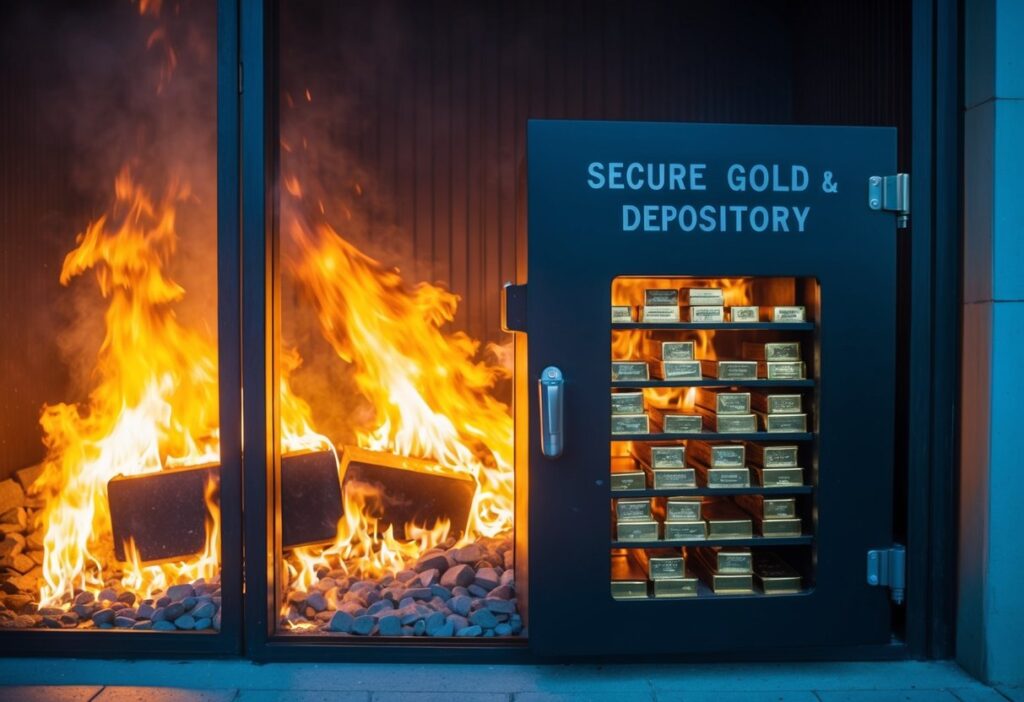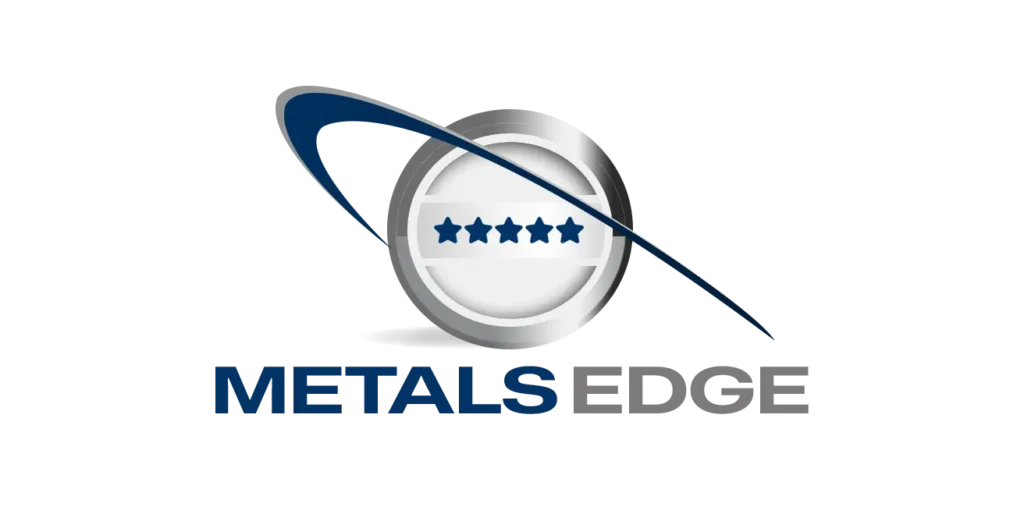In the face of natural disasters like wildfires, individuals often seek reliable ways to protect their assets. Storing gold and silver in a precious metals depository account offers a secure solution, safeguarding these valuable assets from unforeseen risks. Precious metals depository accounts provide peace of mind by ensuring that gold and silver are kept safe during emergencies, allowing owners to focus on other priorities.
The role of a depository is to keep gold and silver out of harm’s way and ready for use when needed. This assurance is crucial as these metals are not only valuable but also serve as a hedge against economic uncertainty. In addition to their protective value, depositories offer easy access to assets, ensuring that their liquidity can be accessed during crises.
Depositories bring added benefits, such as compliance with regulations and protection from theft or damage. With options to integrate into broader investment portfolios, precious metals depository accounts offer versatile and secure storage solutions for gold and silver during unpredictable events like wildfires.
Key Takeaways
-
- Depositories protect gold and silver during crises like wildfires.
- They provide regulated and secure storage solutions.
- Precious metals remain accessible and liquid when needed.
Open a MetalsEdge Storage Account here: https://metalsedge.com/newaccount
The Importance of Protecting Your Precious Metals
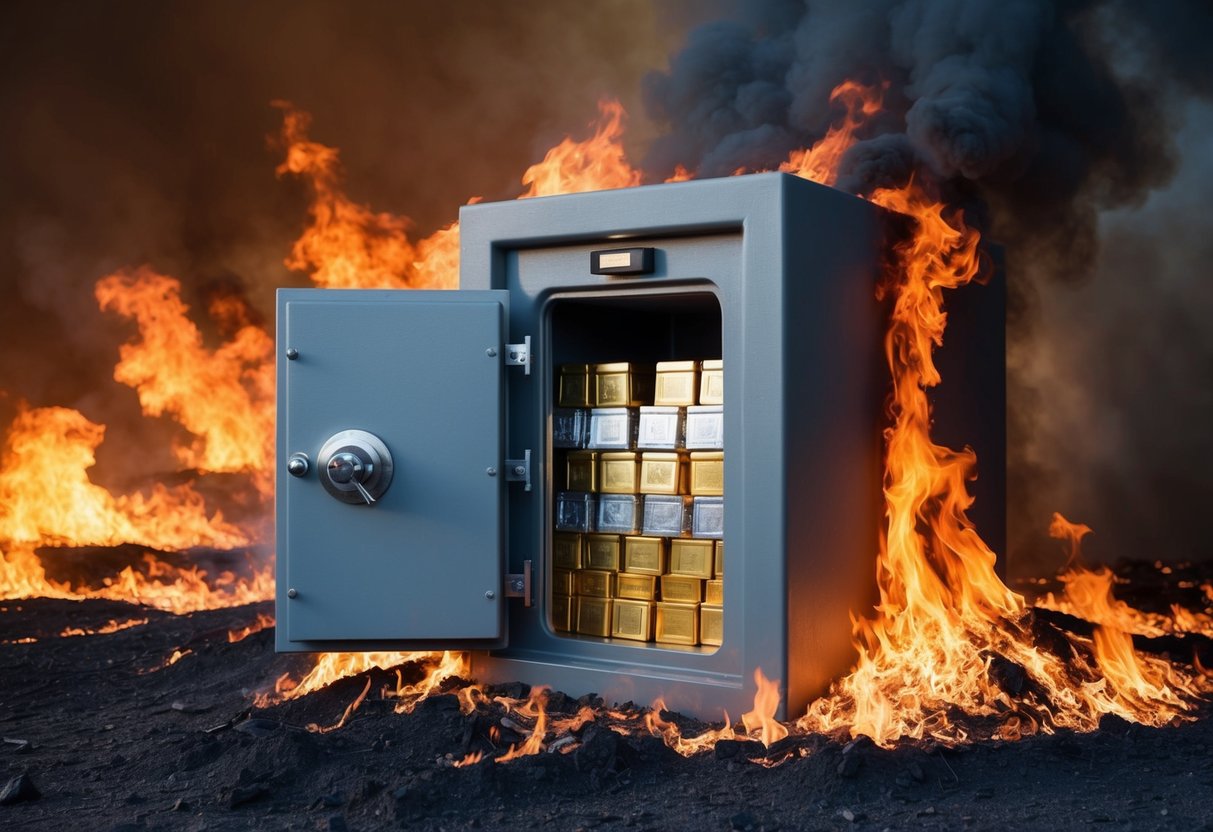
Protecting precious metals like gold and silver from damage and theft is crucial. Using a secure depository account can help minimize risks and ensure their safety. This section explores the risks of owning physical metals and the advantages of using a depository.
Risks of Physical Precious Metals Ownership
Owning physical precious metals like gold and silver can be risky. One major concern is theft, as these metals are valuable and easy to sell. They can be a target for thieves if not stored securely. Home safes might not offer enough protection.
Environmental factors also pose risks. Exposure to humidity or temperature changes can cause damage, such as tarnishing. Handling can leave scratches or other marks, lowering resale value.
Insurance for physical storage can be costly. Some insurance policies may not cover natural disasters like wildfires, leaving owners unprotected. Proper coverage is essential but can be difficult to find at affordable rates.
Benefits of a Depository Account
A depository account offers a secure option for storing precious metals like bullion. These facilities provide high-level security and reduce the risk of theft. Depositories often have better insurance coverage than home storage solutions.
Segregated Storage ensures that specific assets are kept separately, avoiding mix-ups and ensuring customers access their exact holdings. This can increase peace of mind for investors.
Depository accounts focus on preserving the condition of metals. With controlled environments, gold and silver are safe from moisture and temperature changes that cause damage. Depository accounts can be a practical solution for people seeking safety and reliability for their metal investments.
Understanding Depository Storage Solutions
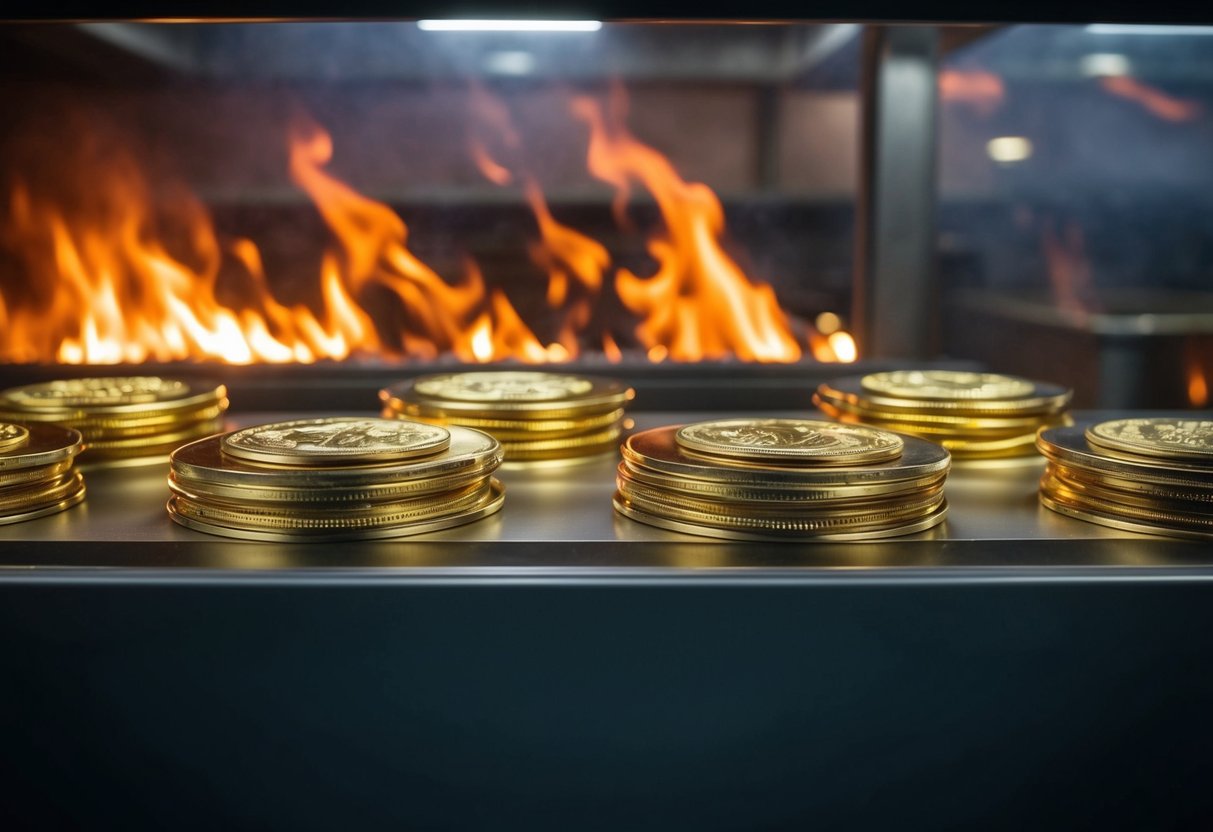
Depository storage solutions offer a secure way to store precious metals like gold and silver. These facilities provide different types of accounts, cost considerations, and security features tailored to meet the needs of investors.
Segregated vs. Allocated Storage
Depositories often provide two types of storage: segregated storage and allocated storage. Segregated storage ensures that the customer’s metals are stored separately from others. Each investor’s holdings are individually identified and not mixed with others.
On the other hand, allocated storage means investors own specific physical metals but these are kept together with other customers’ metals. Each item remains identified, though stored collectively. This is a common choice due to its lower cost compared to segregated storage.
Storage Fees and Cost Considerations
The cost of storing precious metals in a depository depends on several factors. These include the type of storage chosen and the value of the assets. Storage fees may be charged as a percentage of the metal’s value or as a flat rate.
Depositories often charge extra fees for insurance and management. It’s important for investors to understand the fee structure and choose a storage solution that fits their budget. An IRS-approved depository is a requirement for precious metals IRAs, which might also influence the overall costs.
Secure Storage Facilities and Their Features
Security is one of the main reasons investors choose depository storage. These facilities are designed with advanced security measures to protect precious metals from theft and damage. Features often include round-the-clock monitoring, alarms, and secure vaults.
Some specialized facilities also offer insured, climate-controlled environments to protect metals from environmental damage. Private depositories and government facilities like Fort Knox use cutting-edge technology to ensure that metals remain safe and intact. Using a precious metals depository not only gives peace of mind but also meets compliance requirements for certain investment accounts.
Regulation and Compliance in Precious Metals Storage
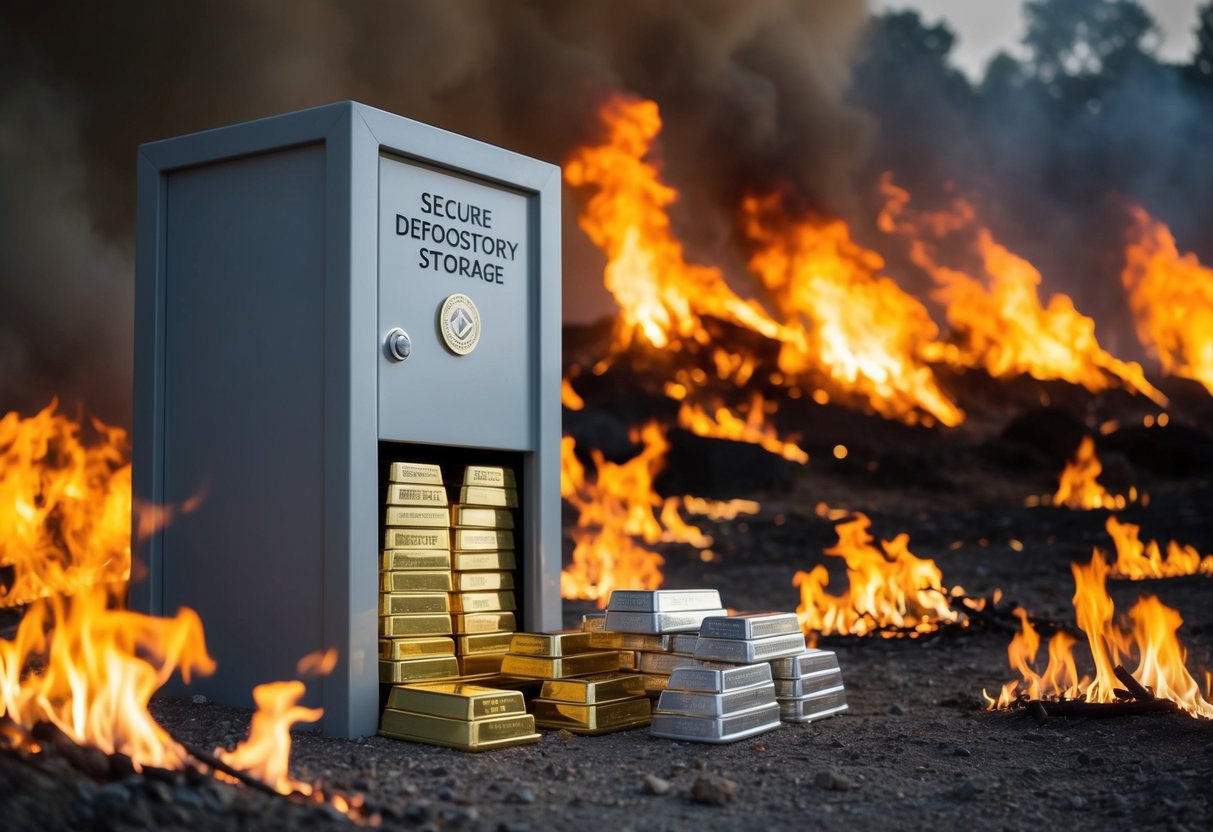
Precious metals storage involves several key regulatory and compliance factors. These include rigorous audits, comprehensive insurance policies, and adherence to IRS standards for approved depositories. Each aspect ensures the safety and security of investments while maintaining transparency and accountability.
Audits and Accountability
Audits play a crucial role in maintaining trust and ensuring compliance in precious metals storage. Reputable depositories conduct regular audits to verify inventory and ensure accuracy. These audits are performed by independent third-party firms to prevent conflicts of interest. They assess the quality, quantity, and condition of stored metals to ensure they match client records.
Detailed reports from audits provide transparency and protect investors by holding the depository accountable. Clients can access these reports to monitor their investments and ensure adherence to agreed-upon storage agreements. Regular audits help maintain a depository’s integrity, making it a reliable option for storing precious metals.
Insurance Policies and Protocols
Insurance policies are essential to cover potential risks associated with storing valuable metals. Depositories offer comprehensive insurance coverage against theft, damage, and loss. These policies ensure that assets remain protected under various circumstances that could negatively impact the stored metals.
Protocols are in place to handle claims efficiently and provide reassurance to investors. Insurance companies often set strict guidelines for depositories to comply with, ensuring their facility and practices meet high security standards. This attention to detail forms a layer of protection and peace of mind, emphasizing the importance of choosing a well-insured facility.
IRS-Approved Depositories and Compliant Practices
Using an IRS-approved depository is mandatory when holding precious metals in IRA accounts. These depositories adhere to IRS guidelines to maintain tax-deferred status on investments. Compliant practices include secure handling, timely reporting, and adherence to strict storage protocols, fostering trust and transparency.
An IRS-approved depository ensures that it maintains the highest standards for security and operations. Customers benefit from these best practices, knowing their assets are stored in a manner compliant with federal regulations. This further strengthens the legitimacy and security of precious metal investments.
Choosing the Right Precious Metals Depository
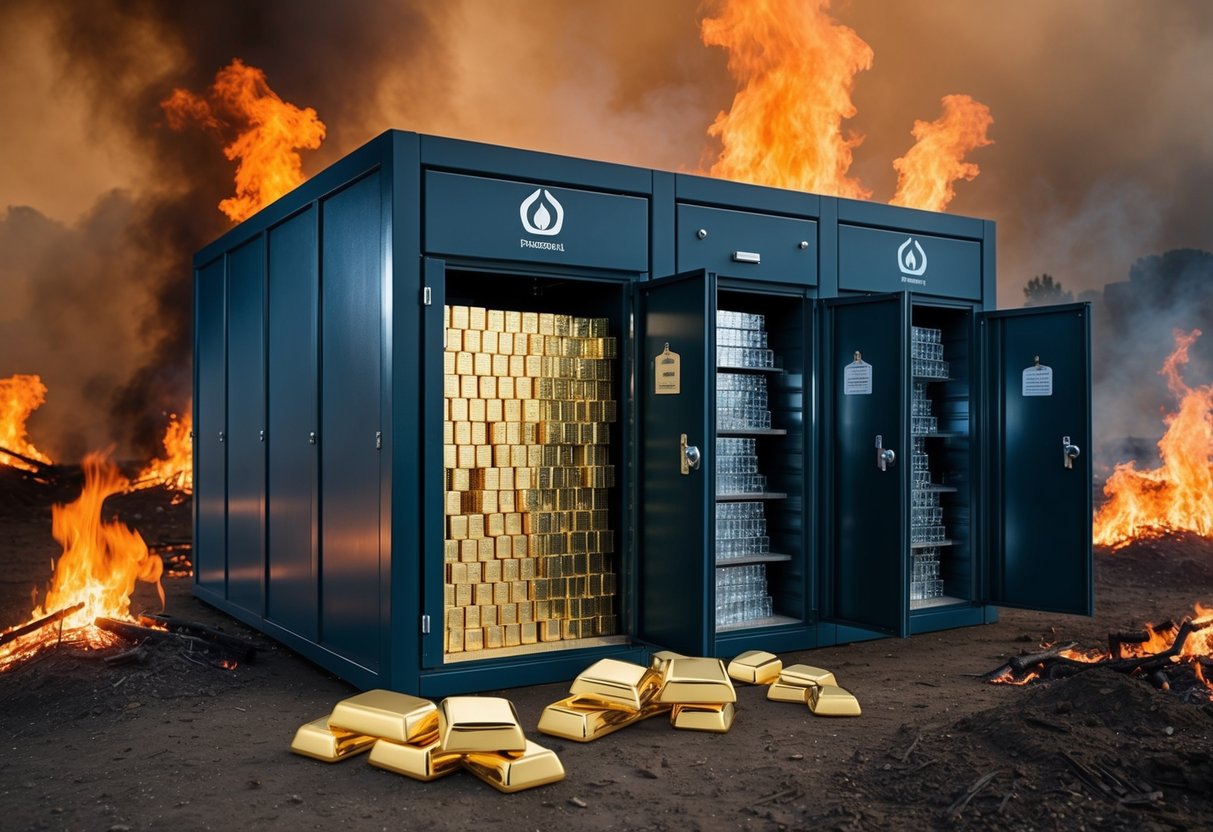
Selecting the best depository for precious metals involves crucial considerations. Choosing the right one ensures peace of mind by safeguarding valuable investments like gold and silver from potential risks such as natural disasters, theft, or economic instability.
Comparing Depository Services
Different depositories offer a variety of services that investors should compare. Some provide comprehensive insurance and regular audits, which are essential for peace of mind. Others might offer online access to account information for better tracking.
Fees can vary greatly; it’s important to consider both storage and transaction costs. High fees can eat into profits, so balancing cost against features is critical. Additionally, depositories may also offer buyback programs, allowing easier liquidation when necessary.
Evaluating Security Features and Access Controls
Security is a top priority when storing precious metals. The right depository should have top-tier security features, including 24/7 surveillance and advanced alarm systems. Robust physical barriers and restricted access areas add extra layers of protection.
It’s also wise to look for facilities with strong access controls, such as biometric systems or key card access. Limiting entry to authorized personnel ensures additional safety of stored assets. Regular security audits and checks further guarantee asset protection.
Depository Location and Its Significance
The location of a depository can play a significant role in the safety and accessibility of precious metals. Choosing a facility outside natural disaster-prone areas reduces the risk of loss from events like wildfires or floods. Proximity is also important for those who prefer personal access to their metals.
Some investors may opt for international options for geopolitical safety, diversifying risk across borders. Ensuring the location aligns with personal or financial goals is crucial when making a final decision.
Integrating Precious Metals Depositories with Investment Portfolios
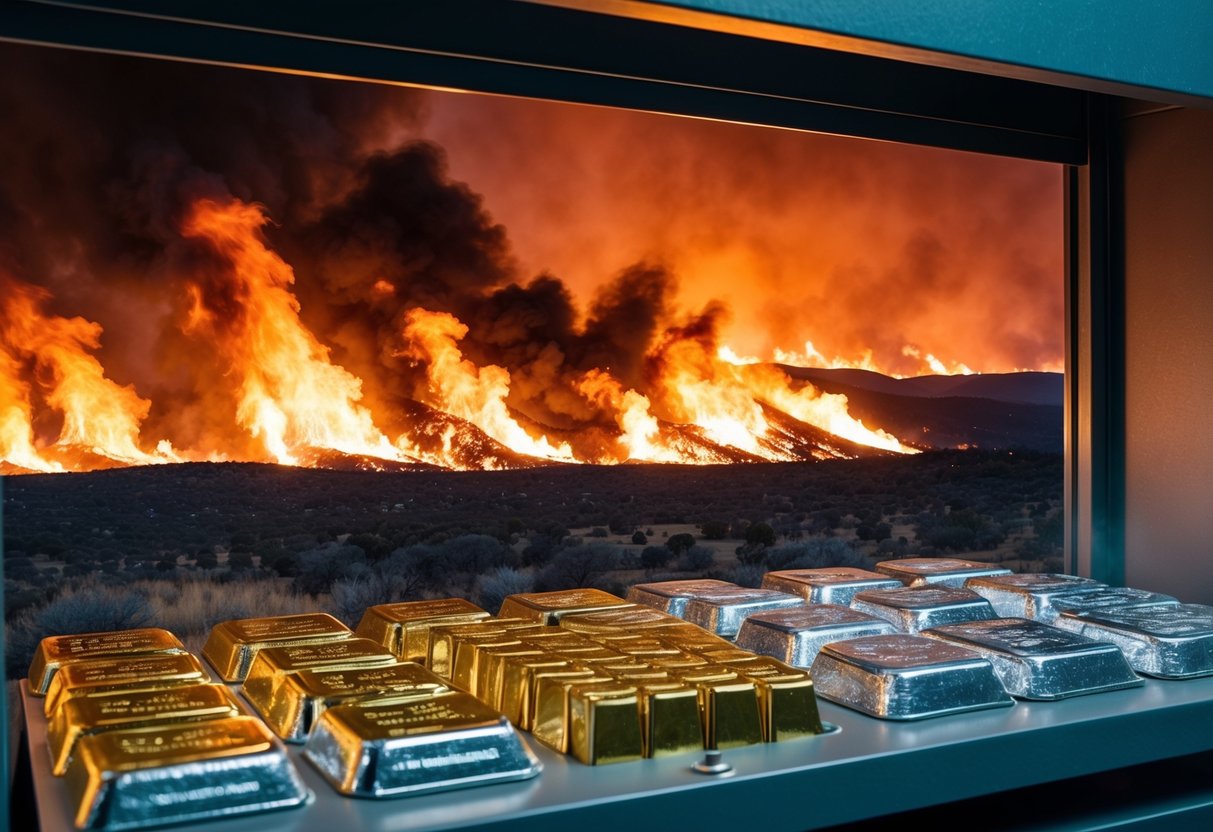
Integrating precious metals into investment portfolios can offer stability, security, and financial growth potential. These assets provide unique benefits, especially when using a depository and a Precious Metals IRA. The following sections will discuss these advantages along with collaboration with IRA custodians and the implications for liquidity and taxation.
Advantages of a Precious Metals IRA
A Precious Metals IRA allows investors to incorporate physical assets like gold and silver into their retirement savings. Security is a key benefit, as these metals are stored in a secure precious metals depository. This reduces the risk associated with storing significant wealth at home.
Diversification is another advantage. Precious metals tend to move differently compared to stocks and bonds, providing a hedge against market volatility and economic downturns. Moreover, these IRAs may offer tax deferred growth, much like traditional IRAs, enabling investors to grow their wealth over time without immediate tax implications. Carefully considering the regulatory requirements and setup costs is important, as these factors can influence the overall effectiveness of the investment strategy.
Collaboration with IRA Custodian and Financial Institutions
Working alongside an IRA custodian and financial institutions is crucial for managing a Precious Metals IRA effectively. Custodians help handle the administrative tasks of the IRA, ensuring compliance with IRS regulations. They arrange the purchase, storage, and management of metals through qualified depositories.
Financial institutions, including banks and other investment services, can provide guidance on selecting appropriate metals based on investment goals. Collaborating with these entities simplifies the process and ensures that all legal and financial protocols are followed. This support is valuable for investors new to precious metals, offering insights into market trends and strategic diversification.
Liquidity and Taxation Implications
Liquidity is a significant consideration for those integrating precious metals into their portfolios. Liquidity is often seen as a challenge, as physical metals cannot be quickly converted to cash like other assets. However, partnering with the right financial institutions or depositories can facilitate faster transactions.
Taxation is another factor that needs attention. Precious Metals IRAs offer potential tax advantages, such as deferred taxes until withdrawal, similar to other IRAs. On the downside, hefty penalties can apply if metals are improperly withdrawn from the IRA before retirement age, making it essential for investors to carefully understand tax regulations.
Real-World Scenarios: Gold and Silver in Times of Crisis
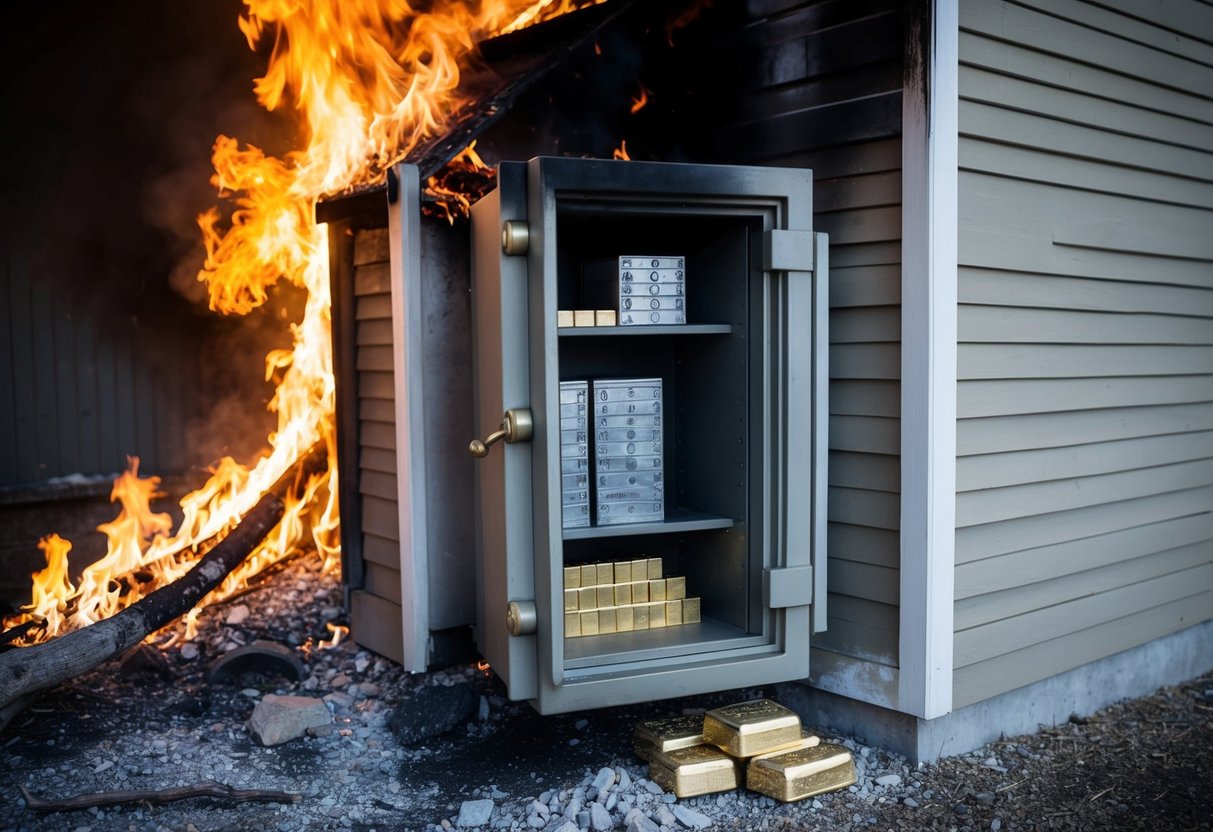
Gold and silver play crucial roles during economic disruptions. They often serve as stable investments when traditional assets falter. This section explores how precious metals behave in crises and their significance as sound money.
Case Studies: How Depositories Responded to Adverse Events
Precious metal depositories have been pivotal in safeguarding investments during crises. For example, following events like natural disasters or financial market crashes, these institutions provide security by physically storing gold and silver. Such practices ensure that individuals have access to stable assets, even in uncertain times. Depositories employ measures like 24/7 surveillance and advanced vault technology. This enhances confidence in the safety of assets, allowing investors to focus on their financial strategies rather than the safeguarding of their physical gold and silver.
The Role of Gold and Silver as ‘Sound Money’
Gold and silver have long been considered sound money, maintaining intrinsic value through historical upheavals. Their value doesn’t rely on centralized trust, unlike fiat currencies. During economic crises, these metals provide a hedge against inflation and currency devaluation. This is largely because they aren’t subject to political decisions affecting currency supplies. Their history as reliable stores of value over centuries strengthens their role as financial anchors. Investors often turn to these metals, knowing they retain worth beyond paper money’s fluctuations.
Impact of Market Turbulence on Precious Metals Investing
Market turbulence often leads to increased investment in gold and silver. During financial downturns, the gold-silver ratio tends to rise, with investors favoring gold due to its stability. Silver, however, also attracts attention due to its affordability and potential for significant gains. The volatile nature of market conditions increases demand for these metals, driving their prices up. This investment surge highlights the continued relevance of gold and silver as secure options during uncertain times. The metals’ ability to withstand market shifts makes them appealing for those seeking reliable financial havens.
Final Considerations for Precious Metals Owners

Owning precious metals involves important decisions to protect investments. Choosing the right types of metals and storage strategies ensures both security and lasting value. Looking ahead, advancements in storage and security will continue to shape the landscape for metal owners.
Selecting Precious Metals and Coins for Depository Storage
Choosing which metals and coins to store can influence both security and potential returns. Gold and silver are often favored due to their historical stability. Silver is known for its use in various industries, making it a practical choice.
Coins, such as bullion coins, are popular for their well-established value and easy tradeability. Rare coins can also be a valuable addition, but they require careful evaluation to avoid overpaying. Always look for accredited dealers and verify the authenticity of any metals before purchase. This ensures not only secure storage but also maximizes the investment’s potential.
Strategies for Long-Term Storage and Wealth Preservation
Secure storage is crucial for preserving wealth through precious metals. Depository storage provides advantages like high-level security and insurance coverage. Choosing a facility that undergoes independent audits can further ensure safety.
Long-term storage strategies might include diversifying the types of metals held, thus spreading risk. Regularly reviewing storage conditions and insurance policies is also wise. These steps help mitigate potential losses and maximize the financial security that precious metals offer throughout economic changes.
The Future of Precious Metals Storage and Security
The future of precious metals storage lies in technological advancements. Innovations will likely enhance security measures, such as biometric access controls and continuous surveillance. This will help metal owners feel even more secure about their investments.
Additionally, demand for safe storage facilities is expected to grow, leading to more options and possibly lower costs. As security technology evolves, it is crucial for investors to stay informed about new developments. This knowledge will ensure that they are always taking advantage of the best methods for securing their valuables.
Frequently Asked Questions
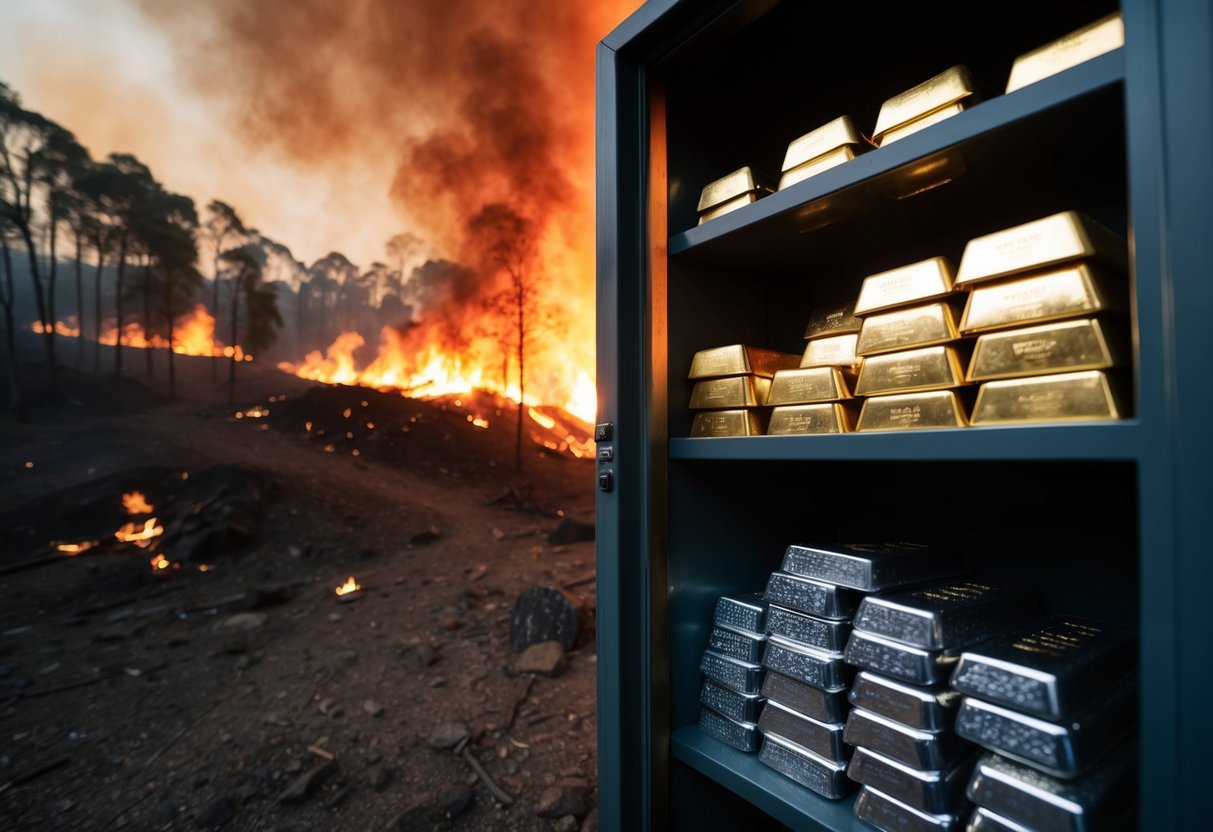
Choosing a precious metals depository provides a strategic approach to safeguarding investments like gold and silver. This section covers key topics to help investors understand how depositories function and how they protect assets during events like wildfires.
How can precious metals be protected during a wildfire?
Precious metals depositories are specially designed facilities that provide enhanced security against natural disasters, including wildfires. They utilize fire-resistant construction materials and climate-controlled environments to prevent damage to stored metals.
What are the benefits of using a precious metals depository for investment security?
Depositories offer secure storage, insurance, and other protective services. By utilizing a depository, investors gain peace of mind knowing their metals are stored in a highly secure facility, reducing the risks associated with home storage.
Are gold and silver investments secure in the event of a natural disaster?
Yes, depositories are equipped to handle natural disasters, ensuring the safety of gold and silver. They have robust disaster preparedness plans, including backup power systems and secure vaults, to safeguard assets in unexpected events.
What measures do depositories take to safeguard gold and silver holdings?
Depositories implement several security measures, such as round-the-clock surveillance, access control systems, and armed security personnel. They also employ advanced technology to monitor facilities and protect against unauthorized access.
In what ways does storing precious metals in a depository differ from home storage?
Depository storage offers professional security and insurance coverage that home storage typically lacks. Investors benefit from reduced liability and risk, knowing their metals are stored in theft-proof and disaster-resistant environments.
What should one consider when selecting a precious metals depository?
When selecting a depository, factors to consider include security measures, insurance options, cost, location, and reputation. It’s important to choose a facility that aligns with an investor’s specific needs and offers transparent services to ensure trust and reliability.





